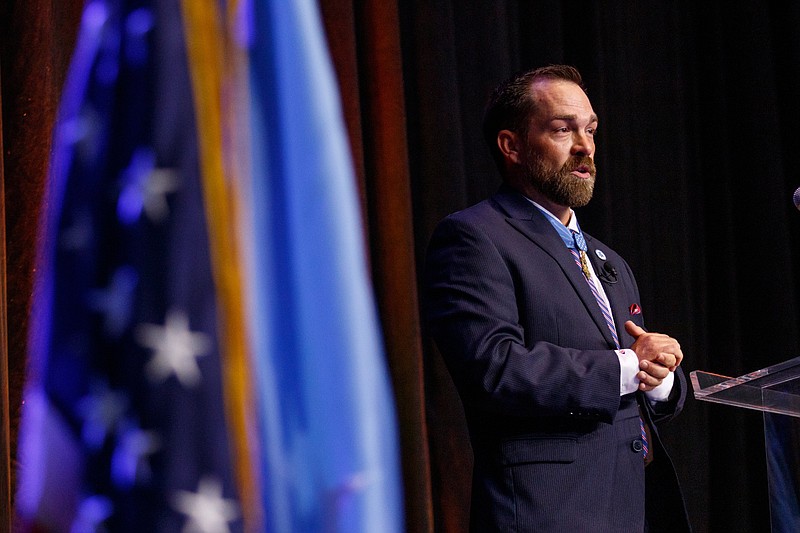"Hundreds of insurgents armed with automatic rifles and rocket-propelled grenades stormed a pair of remote outposts near the Pakistan border," The Associated Press described it, "killing eight U.S. soldiers ... . The fierce gunbattle, which erupted at dawn Saturday in the Kamdesh district of mountainous Nuristan province ... raged throughout the day."
It was, the AP reported in a news story carried by this newspaper on Oct. 5, 2009, the deadliest assault against U.S. forces in more than a year.
To many in the United States, the wars in Afghanistan and Iraq over the past 18 years are just something "over there," something our "Army" deals with, something the federal government handles. Nothing for them to think about.
For Clint Romesha, it was real life. The then-Army staff sergeant was there on that day, Oct. 3, 2009, at Combat Outpost Keating, when the report came in of enemy fire. Now for that outpost, it was a daily occurrence. But this day was different, and when it was over eight of his fellow soldiers lay dead, but Romesha and other fellow soldiers had held the outpost.
For his leadership in the battle, the young California soldier was awarded the Medal of Honor, the country's highest and most prestigious personal military decoration.
Last week, Romesha told the story of that harrowing day at the third annual Celebration of Valor fundraiser for the Charles H. Coolidge National Medal of Honor Heritage Center, which is currently being outfitted in the Tennessee Aquarium Plaza.
For those unfamiliar with the Medal of Honor, its lineage runs from the battles for Chattanooga during the Civil War to the prolonged struggles in Afghanistan and Iraq.
The medal, though, is not a trinket with which to glorify war but - according to Romesha, speaking to the crowd of more than 800 during the fundraiser at the Chattanooga Convention Center - a testimony to everyone who ever wore the uniform for any branch of the military.
In his book, "Red Platoon," he said the honor belongs to his eight lost comrades.
"Like it or not," Romesha wrote, "there are eight other guys with whom I served to whom that medal rightly belongs, because heroes - true heroes, the men whose spirit the medal embodies - don't ever come home. By that definition, I'm not a true hero. Instead, I'm a custodian and a caretaker. I hold the medal, and everything it represents, on behalf of those who are its rightful owners."
For the section leader for Bravo Troop, 3-61st Cavalry, 4th Brigade Combat Team, 4th Infantry Division, wearing the uniform was a family tradition. His grandfather took his brother's place in the draft in the summer of 1943 and wound up serving at Normandy, France, a few days after D-Day, and then during the Battle of the Bulge during the winter of 1944-1945. His father served in two tours in Vietnam, including excursions with the 4th Infantry Division near the country's border with Cambodia.
Romesha's two older brothers also served, and he admitted in his book he dashed his father's hopes of him entering a Mormon seminary when he joined the Army in 1999.
As National Medal of Honor Heritage Center officials noted last week, Chattanooga has a similar legacy with the prestigious military honor.
The first Medals of Honor were awarded to 19 Union soldiers - Andrews Raiders - in what became known as "The Great Locomotive Chase," which ended near Ringgold, Georgia, in 1862. Subsequently, a total of 33 Medals of Honor would be given to soldiers for their actions in the 1863 battles around Chattanooga - in Chickamauga, Lookout Mountain or Missionary Ridge.
Eight of Andrews Raiders are buried in the Chattanooga National Cemetery. Three other Medal of Honor recipients are also buried there, including Desmond Doss, the first conscientious objector to be given the honor and the subject of the 2016 Oscar-winning movie "Hacksaw Ridge."
The center, which is expected to open early next year, also bears the name of Coolidge, the Signal Mountain resident who was awarded the Medal of Honor for his heroics in France in 1944.
It also will honor the exploits of other Tennesseans, who form pieces of that tapestry that runs from the Civil War through today. Among those, two, David Robert Ray of McMinnville and Don Jenkins of Nashville, were honored for their actions during the Vietnam War in 1969, 50 years ago this year.
Romesha, in helping weave that tapestry, asked Vietnam veterans in the audience at last week's fundraiser to stand. None of them were Medal of Honor recipients, but he indicated they nevertheless embody the character traits of citizenship, courage, commitment, integrity, patriotism and sacrifice that are taught in the local Medal of Honor Foundation's Character Development Program.
In leading our everyday lives, we should do no less.
